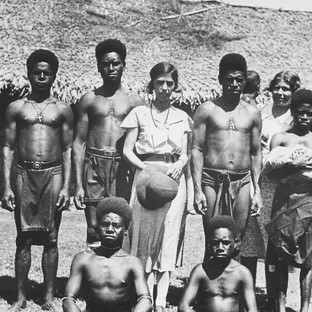
The Emergence of Activism – Early to Mid-Twentieth Century
Women achieved new roles mid-century. They became teachers, missionaries, pastoral carers and continuing philanthropists. Women found themselves to be activists through increasing leadership roles available, in particular in missionary work.
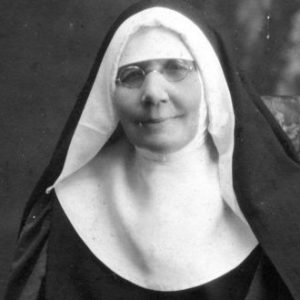
Emma Crawford (1864-1939)
Nun, founder of schools and educator of girls
Click for More
Emma Crawford (1864-1939)
Emma Crawford, better known as Mother Emma, was instrumental in the establishment of schools for girls in Queensland. She was the leader of the Society of the Sacred Advent for 33 years from 1906 to her death in 1939.
Mother Emma, who led the Society of the Sacred Advent from 1906 for 33 years, saw its work and influence extend into the field of education. Religious instruction was banned in Queensland schools under the Education Act of 1875. Under Sister Emma’s stewardship, Anglican girls’ schools were established in all three Dioceses in Queensland – Brisbane, North Queensland, and Rockhampton. The success of these schools led to the provision of a unique and precious education for thousands of girls throughout Queensland.
Emma Crawford, teacher and Mother Superior, was born at Woolwich, Kent, England. Well educated and probably with some teaching experience, she came to Queensland shortly before her admission to the Anglican Society of the Sacred Advent in September 1896.
During World War 1 Mother Emma accepted the invitation of Bishop Feetham, North Queensland, to establish boarding schools for country girls in his Diocese at Townsville, Herberton and Charters Towers. After the war she acquired All Saints Hostel, Charleville, for far-west children attending the local state school, and in 1922 she accepted responsibility for St Martin’s War Memorial Hospital in Brisbane. Her last major venture was the foundation of St Aidan’s School at Corinda in February 1929.
Under her leadership she managed to get the balance right between the spiritual, the secular and the material sides of life. This in turn helped to make the Girls’ Schools in Queensland so successful and unique. Children loved Mother Emma and in turn she loved children. Her gentle nature and her calmness and sincerity appealed to them.
When Mother Emma died of cancer in 1939, the Society was working in three of five Queensland dioceses. The Society never had more than thirty professed Sisters. On her death Bishop Feetham described her as ‘the principal benefactress of this Diocese’. Her most significant contribution was in moderating materialism and secularism in many aspects of Queensland life. A contemporary in the Society described her as every inch a lady who could be icy if displeased, but always remained calm, even under great stress. Once, she managed to persuade Archbishop Donaldson to her point of view on which his opinions had been equally firm.
https://adb.anu.edu.au/biography/Crawford-emma-5811
Geise R.F. The Sisters of the Society of the Sacred Advent and their contribution to Educating Girls Since 1895. Victory Press, Bribie Island, 2012

Zina Cumbrae-Stewart (1868-1956)
Community, social and charity worker, advocate for women
Click for More
Zina Cumbrae-Stewart (1868-1956)
Zina Cumbrae-Stewart was a leading light in the Australian Red Cross. She was an executive member in Queensland for 22 years. She led campaigns against the exploitation of children and for domestic science education. In 1931 she helped found the Queensland Social Service League which provided aid during the Great Depression.
Zina Cumbrae-Stewart, a deeply committed Evangelical Anglican, President of Mother’s Union for 9 years, was very involved in community and charitable service. These included Australian Red Cross, President of the National Council of women (1926-35), a founder of Queensland Social Service League. She organised a luncheon at the Lyceum Club in 1928 for the visit of Maude Royden, an English suffragette, and first campaigner for the ordination of women in England in the early 20th century.
Zina Beatrice Selwyn Cumbrae-Stewart, community worker, was born at Brighton Victoria, the daughter of Robert Hammond, a stock and station agent and her Mother Jessie. Her Father died in 1875 leaving a widow and ten children. Zina grew up in the lively social life of well-to-do Brighton society until the bank crash of 1893 ruined her Mother. She attended Mrs R. Sadleir Forster’s Ladies School , St Kilda, and returned there to teach drawing. In 1906 she married Francis Cumbrae-Stewart.
They lived in Brisbane and their only child was born in 1908. Her husband became Registrar of the University of Queensland, so she was a well connected woman in the upper echelons of society. A deeply committed evangelical Anglican, Zina undertook community and charitable service. She won its long service medal as an executive member of the Australian Red Cross in Queensland for twenty-two years. She led campaigns against the exploitation of children and for domestic science education; she sought different sections for the sexes in community organisations. In 1931 she helped found the Queensland Social Service League to cope with Depression problems, joined its executive and became vice-president of the women’s division. Through the National Council of Women she was on the Australian Broadcasting Commission’s education committee for four years. A fluent speaker, she gave some radio talks.
Mrs Cumbrae-Stewart was usually on the executive of the twenty or more societies to which she belonged; they included the Mothercraft Association, the Traveller’s Aid Society, the Bush Nursing Association and the Shakespeare Society. Brusque in public, she had a lively sense of humour in private. She regarded her own abilities as giving her a right to leadership and to the exercise of a formidable dignity. She enjoyed putting down pretentious or silly people but believed nonetheless that her first responsibility was to be a good wife and mother. To her son ‘she was like those grand old ladies whose pictures hang in the National Portrait Gallery in Edinburgh who plainly had no need of rights.’
In 1936 the Cumbrae-Stewarts visited Britain, representing the Queensland Red Cross. She had planned a busy programme of public work which was cut short when her husband’s illness forced a hurried return to their new Melbourne home. After his death she lived with her bachelor son. When he moved to Hobart as deputy parliamentary draftsman she joined him there, making her first flight in 1948. She died in Hobart in 1956 and her body was returned to Melbourne for burial in Burwood Cemetery.
Nancy Bonnin. Australian Dictionary of Biography, Volume 8, (MUP),1981
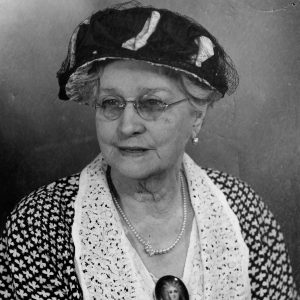
Eliza Tritton (1871–1968)
Philanthropist
Click for More
Eliza Tritton (1871–1968)
Eliza Tritton, wife of Frederick Tritton, a well known retailer, was active in Church based charities throughout her 97 years. Among other interests she was a leader of the Girls’ Friendly Society, the Queen Alexandra Home for orphaned children, the District Nursing Association and the Soldiers’ Church of England Help Society.
A well known retail furniture store in George St, Brisbane was established by Frederick Tritton after the 1893 floods. Not so well known in history is his wife Eliza Tritton, a devout Anglican woman, active in charities associated with St Columb’s Anglican Church, Clayfield where she was a leader in Girls’ Friendly Society and Ladies Guild, active in fund raising in fetes and concerts.
Eliza Worrall, born in 1871, migrated to Australia and married Frederick Tritton in 1893 at Holy Trinity Anglican Church, Woolloongabba.
Mrs Tritton was a State office bearer of the Girls’ Friendly Society. She established the St Columb’s branch and in 1914 girls spent evenings at Mrs Tritton’s residence. The girls worked for the Sale of Work all year and handed over all their takings for the extension of the Church and painting. Archbishop Donaldson, speaking to GFS in 1915 said “our boys have proved they stuck at things at Gallipoli. And what the boys could do the girls must”.
She left in 1919 as President of the Guild at St Columb’s Church, “a post she has most ably filled for many years”.
The Trittons were the main benefactors of the Queen Alexandra Home of orphaned children, children of single mothers and abandoned children in Coorparoo. Mrs Tritton was the Head of the Management Committee. Her daughter Nell recalls that her Mother took her daughters to Queen Alexandra Home and made them donate their toys to the children. She remembered her Mother telling her that what counted in life was not what you possessed but what you could do for those in need. She was also President of the District Nursing Association.
In 1915 she was a foundation member of the Soldiers’ Church of England Help Society. A meeting of women was convened by Canon Garland, Resident Chaplain of the Camps. Membership was open to any women members of the Church of England on payment of a minimum of 1/- (shilling) monthly. Objects were:
- To raise funds for the work of the Church of England in the Camps.
- To provide social and recreation entertainment for soldiers of all denominations while in Camp.
- To assist Chaplains at the Front
- To assist the work of the Anzac Club for Returned Soldiers
Mrs Tritton formed the Clayfield Branch. Lady Goold-Adams, wife of the Governor of Queensland sat on a charity committee with Mrs Tritton. Over morning tea the Governor’s wife asked her if part of their large home Elderslie could be made available for Red Cross volunteers from Clayfield to use as a packing depot for parcels which were to be sent to Australians overseas. Parcels would include hand-knitted socks, mufflers and balaclava helmets for the Anzacs facing the bitter cold winter of the trenches. Volunteers used the large kitchen to bake fruit cakes and ANZAC biscuits to be sent by ship to southern France, to Australians living in the trenches.
In 1963 Mrs Tritton was awarded an OBE for services to the Church and the community.
At her funeral service in 1968 Jesus’ words were quoted “I am among you as He that serveth, and I have given you an example that you should do as I have done to you”. The late Mrs Tritton in her wonderful service to the Church and community could justly be considered great.
St Columb’s Memorial Church Clayfield. PARISH NOTES, August 1968, Vol.12, No.1
Susanna de Vries. Nell: the Australian heiress who saved her husband from Stalin and the Nazis. Boolarong Press, 2020.
Eliza and Frederick’s marriage register entry (Holy Trinity, Woolloongabba)
Extracts from Girl’s Friendly Society Annual Reports 1909 and 1919
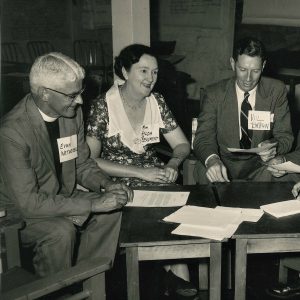
Hilda Beaumont (1911–1998)
Educator and lay Anglican leader
Click for More
Hilda Beaumont (1911–1998)
The Christian educator Hilda Beaumont was the first woman on Diocesan Council, and the first woman member of Diocesan Synod. She held positions as a Christian educator and as a member of many diocesan organisations.
Once dubbed the “Guardian angel of youth”, Hilda Beaumont led a life of dedication to Christian education in the Anglican Church. She was born in 1911 and was a lifetime member of St James’ Kelvin Grove where she was a Sunday School teacher, founder of the GFS (Girls’ Friendly Society), Young Anglican Fellowship leader, fete organiser and parish councillor. She held a diploma (1947) in Christian education from St Christopher’s College Melbourne.
She ran summer schools and conferences for Sunday School teachers at Glennie School, Toowoomba, and Church House Brisbane, taught religious education in state schools and lectured at St Francis Theological College.
Archdeacon Irvine Scott said of her college teaching: “There would be many priests of the Diocese who would value very deeply the skills which she was able to impart at the college”.
In 1930 she joined the Diocesan Board of Christian Education (DBCE) and became the representative on the national General Board of Christian Education. In 1931 she took over the work of the Church Mail Bag School which was a correspondence Sunday School. In 1944 she was promoted to the position of organising secretary of the DBCE until she retired in 1973. The report of Miss Beaumont’s election was followed by these words in the Church Chronicle “So far male supremacy has little to fear but the dyke has been breached”.
Hilda was one of the leading lay officials in the Diocese of Brisbane. She was the first woman on Diocesan Council in 1964, also the first woman appointed a member of the Diocesan Synod; the first woman appointed from Brisbane to General Synod, member of Archbishop Election Committee, Diocesan Committee of ABM and the Diocesan Television and Radio Committee.
She died at St Martin’s Home, Taigum, aged 87. She was always willing to give counsel and support and was remembered with deep love and respect by family and friends.
Commonwealth of Australia Gazette published by the Australian Government Publishing Service No.P7 Canberra, Monday, 1 August 1977
https://wmoa.com.au/uploads/1977P07.pdf
The Australian Women’s Mirror (21 March 1933) vol.9 no. 17 p68
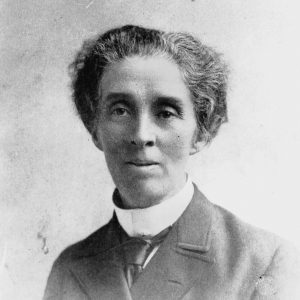
Lilian Cooper (1861–1947)
Doctor and pioneer of hospice and palliative care
Click for More
Dr Lilian Violet Cooper, MD FRACS, 1861 – 1947
Dr Lilian Cooper was the first woman doctor in Queensland, the second in Australia. She was an eminent surgeon who overcame entrenched prejudice to practice medicine and is celebrated as a leading figure in women and children’s health and welfare.
From the time of her arrival in Brisbane in 1891 to her death in 1947 aged 86, Lilian Cooper broke down barriers and worked tirelessly to improve women’s lives and health.
Despite the opposition of many male colleagues, Lilian established a private practice and gained honorary positions at the Lady Lamington Hospital for Women and the Hospital for Sick Children. She established a long association as surgeon with the Mater Hospital in 1905, where she was also one of the first Board members. She undertook a study tour of the United States and Britain in 1911 and gained her MD higher degree from Durham University.
Lilian’s skill and standing was recognised when she was the first woman inducted into the inaugural Royal Australasian College of Surgeons in 1928.
A philanthropist and campaigner for public health and women’s rights, Lilian was equally renowned for her dedicated care of her patients and her pithy and colourful turn of phrase. She was once described as a ‘tall, angular, brusque, energetic woman, prone to bad language’. She publicly decried rapidly-expanding Brisbane’s system of poor roads and sanitation, but importantly laid out how to fix it. Her work ethic was legendary, and she mentored and encouraged other women.
Lilian’s legacy continues after her death, thanks to the determined efforts of her life-long companion, Josephine Bedford, who negotiated the gift of their jointly-owned home, “Old St Mary’s” Kangaroo Point to the Sisters of Charity. The Brisbane Anglican Diocese was first offered the property but lacked the resources to accept the gift, which was conditional on building a hospital for the incurably ill and dying.
Lilian and Josephine’s wish became reality in 1957 as the Mt Olivet Hospital and lives on today, renamed St Vincent’s Hospital.
On the Kangaroo Point cliffs adjacent, in St Mary’s Anglican Church is the memorial window of the Warrior’s Chapel which honours Lilian’s faith and service, particularly as a military surgeon with the Scottish Women’s Hospitals during World War 1.
Denied the ability to serve as a doctor by the Australian Army, Lilian along with several other Australian women doctors and a host of women nurses, ambulance drivers, orderlies and administrators from across the Commonwealth performed some of the most courageous acts of WW1 military surgery and service.
During the harsh winter of the Saloniki campaign of 1916-17 in Greek Macedonia, the women, some of whom were veterans of the suffrage campaigns, became pivotal to Britain’s allies, the Serbs and the French who were fighting German backed troops. In frequent danger and sub-zero conditions high up in the Kaymackchalan Pass, Lilian and the women operated, performed amputations and ferried the wounded in ambulances from an advanced dressing station a few miles from the frontline to their field hospital below.
Lilian’s medal of the Order of St Sava awarded by the King of Serbia for her humanitarian service to the country is displayed at St Mary’s Church, Kangaroo Point.
Born in Chatham, Kent to an upper middle class family, Lilian eschewed a traditional path to follow her vocation. She was spurred on in her quest to study medicine by a like-minded spirit, Mary Josephine Bedford, a family friend, and for the next seventy years they would form a formidable partnership, respecting and supporting each other’s abilities and efforts.
It was through contacts of Lady Lamington, the Queensland Governor’s wife, that Lilian and Josephine migrated and made Brisbane their home. This was no easy path to choose. We are a better and more open society because of it.
Press tributes upon Lilian’s death noted she had never married and acknowledged her life-long friend and companion, Miss Jospehine Bedford. The women’s lives and extraordinary achievements are the subject of a book, several plays, numerous histories, a WW1 centenary recital at St Mary’s Kangaroo Point and a State Library of Queensland ‘Dangerous Women’ podcast episode. They are honoured and revered by women and men and celebrated by the LGBTQI+ community.
They are buried together; the inscription on their grave from the Book of Wisdom reads, “They are thine, O Lord, thou lover of souls”.
Author: Lyn Moorfoot, May 2021, with acknowledgement of LM Williams and Susan J Neuhaus.
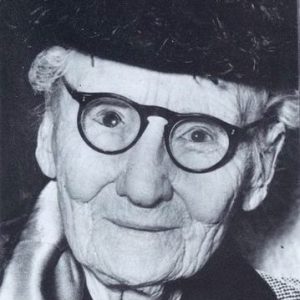
Josephine Bedford (1861–1955)
Public benefactor and companion
Click for More
Josephine Bedford (1861–1955)
Josephine Bedford was the lifelong companion of Dr Lilian Cooper, the first woman doctor in Queensland. They emigrated in 1891. Josephine was a benefactor of the diocese.
Mary Josephine Bedford, born 1861 in London, accompanied Dr Lilian Cooper to Brisbane in 1891. She held executive positions in various organisations including the National Council of Women and the committee of the Lady Lamington Hospital and Children’s Hospital. She helped Lilian establish herself as Queensland’s first female doctor while pursuing her own interest in improving the welfare of the state’s women and children. As the city’s population rapidly grew, Josephine noticed that the inner-suburbs, with their unpaved and unsewered streets, were unsafe for children to play. This realisation, along with the help of a local Reverend, led to the creation of the Crèche and Kindergarten Association (C&K) in 1907. By 1911, four centres were operating in Brisbane and a college for kindergarten teachers had been established. On an extended trip overseas, Josephine studied the concept of ‘supervised play’ and returned to Brisbane in 1918 to help open two supervised playgrounds (in Paddington and Spring Hill). The Bedford Playground in Spring Hill commemorates Josephine’s outstanding contribution to Queensland children.
After the death of Dr Cooper she donated the double stained glass windows to St Mary’s Anglican Church, Kangaroo Point, in memory of Dr Cooper. She died in December 1955.
Lilian and Josephine are also embraced by the queer community for their devotion to each other. This is still an unresolved question but there may be new insights to emerge yet about this. They are buried together in the one grave at Toowong Cemetery.
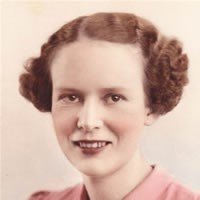
Mavis Parkinson (1915–1942)
Teacher and martyr.
Click for More
Mavis Parkinson (1915–1942)
Mavis Parkinson felt called to be a missionary and trained as a teacher to be sent to New Guinea. She was killed near Popondetta on the way back to Port Moresby.
The tragic, and yet courageous stories of Mavis Parkinson and May Hayman, and the other ten Anglican missionaries who were killed by the Japanese Army in World War 2 in New Guinea are told with the titles “Faithful unto death” and “The Seed of the Church”. The issue remains controversial: whether they should have evacuated from PNG at the imminent approach of the Japanese Army or the decision they made to stay at their Mission stations. The word “martyr” is appropriate, as in the Christian tradition, because they were faithful to Christ and his Church unto death.
Mavis Parkinson, born in 1915, was very involved in St Paul’s Anglican Church Ipswich from a young child. She was a Sunday School teacher and member of the Girls’ Friendly Society. One of the clergy said of her “I believe she had a vision which gave her inspiration; there was a power in her life”. At age 26 she felt the call to missionary service and was a teacher at the Anglican Mission School at Gona, New Guinea. In 1942 the approach of the Japanese army was imminent and she and her friend/colleague Nurse May Hayman made the decision to remain at their station at Gona. It is here that we capture the elegance of Mavis Parkinson. She writes of her last night at the Mission station, in her last letter “both sister and I had on our pretty long dresses, dinner was a gay meal and our lovely polished table with its pretty mats and beautiful flowers did not fail to call forth the usual compliments”.
However, with the close approach of the Japanese invasion, an arduous escape journey ensued for them through the jungle, in the company of another missionary, and some Allied soldiers. They sheltered for a time in a hut in the jungle, but eventually the two were separated from the group, captured, tortured and executed by Japanese soldiers near Popondetta, their bodies thrown into a nearby grave.
Honour is paid to Mavis Parkinson in a number of Churches in Brisbane Diocese. A large Memorial Cross is in the grounds of St Paul’s Church Ipswich, and a Martyrs’ Chapel is inside the Church. She is honoured in the south transept of the St John’s Cathedral stained glass windows, in a group of modern heroic women.
The New Guinea Martyrs are commemorated on September 2 in the Diocese of Papua New Guinea and the Australian Church.
The New Guinea Martyrs are commemorated on September 2 in the Diocese of Papua New Guinea and the Australian Church.
Holland, J. The Destiny and Passion of Philip Nigel Warrington Strong, Lakeside Publishing, Bokarina, 2019.
Rowland, E.C. Faithful unto Death: the Story of the New Guinea Martyrs, Fraser & Morphett, Prahran, 1964.
Hodge, E. The Seed of the Church: the story of the Anglican martyrs of Papua New Guinea. Australian Board of Missions, Sydney, 1992
Bride, M. I wait for the Lord, my soul waits for Him, and in His Word in my hope: a resourced book of the Martyrs of Papua New Guinea and Melanesia, Australian Board of Missions.
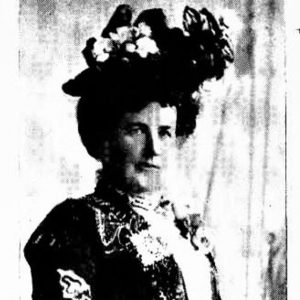
Amy Proctor (1866–1931)
Founder of the mission to the seafarers
Click for More
Amy Proctor (1866–1931)
‘Mrs Proctor’s Mission to Seamen’ began in 1892. Amy Proctor saw the need for welfare, pastoral care and spiritual support for seafarers arriving in the Port of Brisbane. The Mission held concerts, bible studies, and Sunday services led by Mrs Proctor.
Amy Proctor was a woman who started a ministry with very few resources and gave of her all outside the auspices of the diocese. Her ministry later became an official part of the Diocesan structure. It was Amy’s vision that saw the need to provide welfare, pastoral and spiritual support to seafarers arriving in the Port of Brisbane. So, with a group of like-minded women, she formed a committee and began setting up a clubhouse for seafarers where concerts could be performed, Bible classes given, and even Sunday Services held. Premises were outgrown and for two decades there was movement between a number of buildings for what was known as “Mrs Proctor’s Mission to Seamen”.
It is not clear how or why it happened, but in 1914 the Missions to Seamen was ‘officially connected’ to the Brisbane Diocese. This coincided with Amy Proctor’s failing health, perhaps from overwork, and the serious anxiety she had for her sons who were fighting in World War 1. However, she remained on as Superintendent until she resigned in 1916.
Born in Dunedin, New Zealand in 1866, Amy Proctor arrived in Brisbane, with her husband, Percy Proctor, in her mid-20’s. Coming from a seafaring family, she decided that a form of ministry needed to be provided to the many sailors coming to Brisbane at that time.
Her daughter, also Amy, worked with her Mother in untiring efforts for the welfare of sailors. Her daughter says “She always took the services, preached the sermon, and played hymns herself, besides carrying on all the rest of the work”. Her Mother had a long-term association with St Mary’s Anglican Church, Kangaroo Point where she taught the boys Bible class which continued for many years. She died in 1931 at her home in East Brisbane.
A tribute was paid to Amy Proctor by the Master of the SS Irwell, J. Blackburn writing in a monthly magazine devoted to world-wide shipping: “As I spent my last afternoon and evening with Mrs Proctor before I left Brisbane I have a feeling of sorrow when I read of the passing of a lady who was a dear friend to all seafarers regardless of class, and who was held in affectionate regard by everybody with whom she came in contact”.
Amy Proctor is honoured by a stained-glass window in St John’s Cathedral, with a plaque commemorating her work with seafarers.
https://anglican-focus.org.au/2020/10/09/the woman-who-spearheaded-mission-to-seafarers-amy-proctor/.1/25
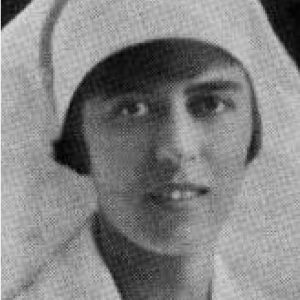
Marjorie Brenchley (1896-1942)
Nurse and martyr.
Click for More
Marjorie Brenchley (1896–1942)
One of the New Guinea Martyrs, Margery Brenchley was a nurse who went to New Guinea in 1927. She was captured by the advancing Japanese army and killed in 1942.
Margery was born in England but migrated to Australia with her brother when she was a teenager. Recognising that nursing was her vocation, she entered Brisbane Hospital for training. While in training she attended the parish of Holy Trinity, Fortitude Valley. They supported her as their missionary from the time she went to New Guinea in 1927 until her death.
Those who knew her as a mission nurse described her as slightly built, usually dressed in brown, with dark hair and eyes, totally devoted to the care of the native people. When Henry Holland moved to the new station of Isivita, she shared the responsibility of running the Sangara station with Lilla Lashmar. From this lonely spot she sometimes travelled to Gona alone with a sick patient.
The mission house and all its furniture was made mostly from local bush materials but they also used the packing boxes in which equipment was carried up from the coast. Their isolation was slightly mitigated by the presence, at a short distance, of the manager of the rubber plantation Louis Austen and his wife.
In July 1942 Margery Brenchley and Lilla Lashmar declined an offer from Australian servicemen to travel to Port Moresby with them, but as their post lay in the direct line of the advancing Japanese, they moved to Isivita, accompanied by Lucian Tapiedi. Early on 22nd July the mission staff began to build a secret camp in the bush for the Europeans.
After a week Henry Holland consulted Andrew Aware and it was agreed that they were not safe in their hide-out, with patrols passing so close all the time and Lucian and Andrew making daily visits. It was then that the decision to travel to the coast was made. A decision which led to their capture and death on Buna beach.